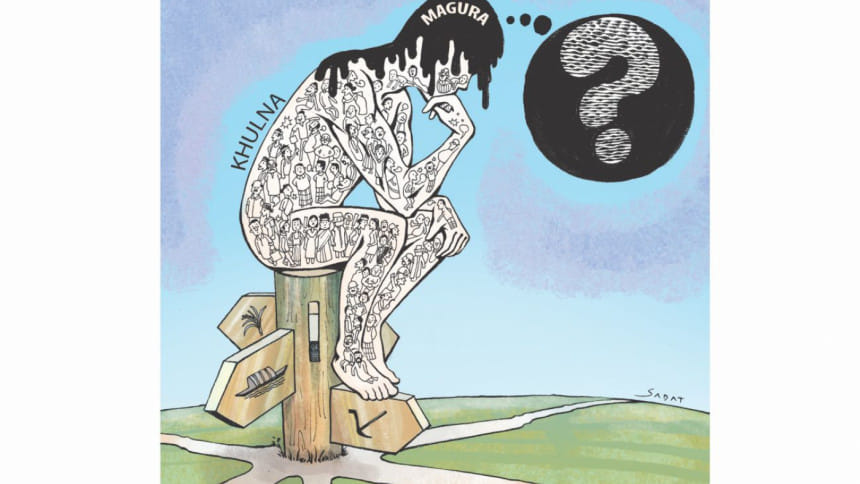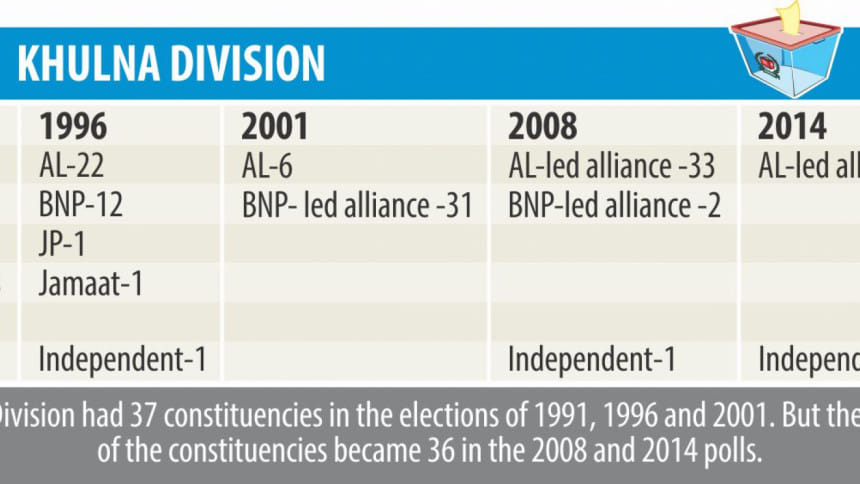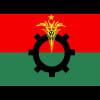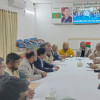The swing division

History says it has been a swing division since 2001.
The first two national polls results, since democracy was restored, show none of the two major parties enjoyed absolute supremacy here.
The BNP won the first election, held in 1991, and bagged 12 out of 37 seats in Khulna division then. Even though defeated in the polls, the AL won 17 seats in the region.
In the next election, the BNP retained the 12 seats but the AL gained another five seats, 22 in total, and beat the BNP.
The polls that followed were dominated by political alliances. The major parties' combines either won landslides or suffered crushing defeats here.
In 2001, the BNP-led four-party alliance, formed before the polls, took 31 seats, reducing AL's tally to only six in the division.
The AL bounced back in 2008 when it formed a grand alliance and captured 33 out of the 36 seats on offer then. The BNP's alliance could manage two seats.
In 2014, the BNP-led alliance boycotted the polls and the AL secured 29 seats alone.
Among the districts in the division, Magura is in the history for a rigged by-election held more than two decades ago and it still haunts politics today.
In the Magura-2 by-polls on March 20, 1994, the then ruling BNP men resorted to unlawful means, like capturing of polling centres, ousting opponent's agents, stuffing and snatching ballot boxes, and intimidation of voters.
That fuelled a street agitation resulting in a one-sided election in February 1996 and introduction of the non-partisan election-time caretaker government system. But the caretaker government system was scrapped in 2011, sparking off a yet-to-be-solved political crisis.
Currently, the political situation in the 10 districts of the division seems to be heavily in favour of the ruling Awami League. Its leaders and activists are vigorously campaigning for multiple potential party nominees while their archrivals, the BNP men, are mostly absent in the field.
In all the constituencies, multiple aspirants of the AL, including incumbent MPs, are projecting the successes of the government and seeking people's support for their bid for office.

Local AL leaders are hopeful of repeating the success they had in the 2008 and 2014 elections.
“We have good organisational strength in district and upazila levels. It will give us an extra punch for victory in the next election,” said SM Kamal Hossain, a member of the AL central working committee who coordinates electoral activities of the AL in Khulna division.
AL nomination aspirant Panchanan Biswas, incumbent lawmaker of Khulna-1, said, "These days I am busy with the campaign. I hope I will get the party's nomination.
"I hope people will vote for us again because the present government has carried out massive development activities across the country."
The BNP camp, meanwhile, has a different story. In most constituencies, the BNP's ticket seekers are quiet and not campaigning properly.
Some are getting in touch with constituents stealthily. Their absence in the areas might lead one to conclude that the BNP would not run from all the seats in Khulna.
Take Satkhira for an example. Not a single BNP nomination seeker is campaigning openly in the district, the second largest in the division with five seats.
Even this time last year, several names popped up as potential candidates but the field seems empty now.
Local BNP leader Abdur Rouf, who wants to run in Satkhira-2, said he has not held any campaign rallies yet.
“The atmosphere is not conducive to campaigning,” he said, adding, “Every time we try to bring out a procession, the police come to arrest us. Even if we are not in the area, we are accused in the cases here.”
Asked about campaign activities, Barun Kumar Biswas, district BNP vice-chairperson, who aspires to run from Satkhira-3, said, “I distributed 1,200 posters.”
Jhenidah has a similar picture. No BNP campaign rallies were seen in the town.
“I am running a door-to-door campaign,” said former BNP MP Shahiduzzaman Beltu, who is preparing to contest the next polls from Jhenidah-4 constituency.
Former Dhaka University senate member Gautam Biswas wants to run from Narail-1 but he does not dare to campaign.
“We are not being able to unify our men to launch the campaign. I was named in more than 10 cases. I don't live in Narail anymore,” said Biswas.
He has been in Jessore for around four years.
Jamaat-e-Islami, a component of the BNP-led 20-party alliance, has strong organisation strength in some areas of the region, particularly Satkhira and Khulna.
The party men, however, have gone into hiding following police crackdown in connection with violence in the areas before and after the last polls.
The crackdown seems to have driven them out of their localities or made them inactive. In the last one year, Jamaat's activities in the region were almost zero.
But locals believe Jamaat has gathered strength in different strategic areas of Khulna and Satkhira.
Jamaat's central Nayeb-e-Ameer Golam Parwar, also former MP of Khulna-5, said, “We are not conducting campaign publicly to avoid harassment by the police. But we have kept in touch with the constituents communicating with them personally.”
Like elsewhere in the country, the AL and the BNP have multiple ticket seekers in the constituencies of Khulna division.
At least 80 candidates are in the race to get AL's nomination in 36 constituencies.
“There may be multiple candidates in different constituencies. But once the boat symbol is allocated to a candidate, all the party men will unitedly work for ensuring victory of the symbol,” said AL leader SM Kamal Hossain.
The BNP has around 45 but the number may increase if it announces that it would be running in the polls.

 For all latest news, follow The Daily Star's Google News channel.
For all latest news, follow The Daily Star's Google News channel. 








Comments